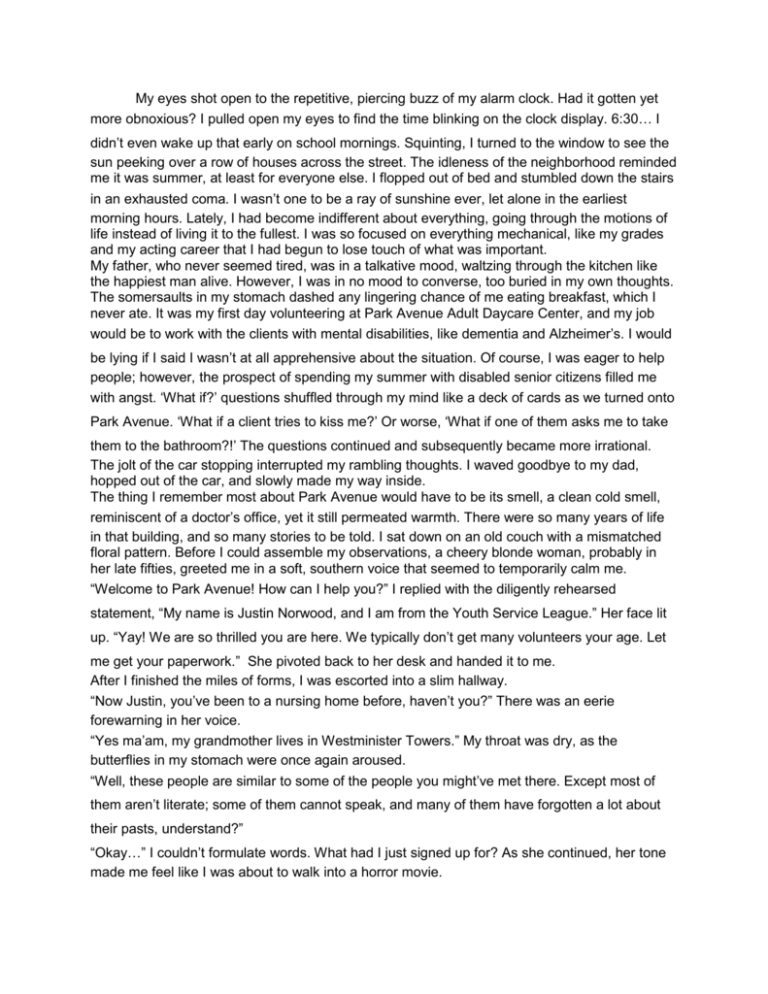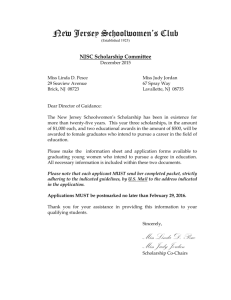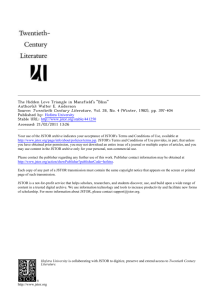My eyes shot open to the repetitive, piercing buzz of my alarm clock
advertisement

My eyes shot open to the repetitive, piercing buzz of my alarm clock. Had it gotten yet more obnoxious? I pulled open my eyes to find the time blinking on the clock display. 6:30… I didn’t even wake up that early on school mornings. Squinting, I turned to the window to see the sun peeking over a row of houses across the street. The idleness of the neighborhood reminded me it was summer, at least for everyone else. I flopped out of bed and stumbled down the stairs in an exhausted coma. I wasn’t one to be a ray of sunshine ever, let alone in the earliest morning hours. Lately, I had become indifferent about everything, going through the motions of life instead of living it to the fullest. I was so focused on everything mechanical, like my grades and my acting career that I had begun to lose touch of what was important. My father, who never seemed tired, was in a talkative mood, waltzing through the kitchen like the happiest man alive. However, I was in no mood to converse, too buried in my own thoughts. The somersaults in my stomach dashed any lingering chance of me eating breakfast, which I never ate. It was my first day volunteering at Park Avenue Adult Daycare Center, and my job would be to work with the clients with mental disabilities, like dementia and Alzheimer’s. I would be lying if I said I wasn’t at all apprehensive about the situation. Of course, I was eager to help people; however, the prospect of spending my summer with disabled senior citizens filled me with angst. ‘What if?’ questions shuffled through my mind like a deck of cards as we turned onto Park Avenue. ‘What if a client tries to kiss me?’ Or worse, ‘What if one of them asks me to take them to the bathroom?!’ The questions continued and subsequently became more irrational. The jolt of the car stopping interrupted my rambling thoughts. I waved goodbye to my dad, hopped out of the car, and slowly made my way inside. The thing I remember most about Park Avenue would have to be its smell, a clean cold smell, reminiscent of a doctor’s office, yet it still permeated warmth. There were so many years of life in that building, and so many stories to be told. I sat down on an old couch with a mismatched floral pattern. Before I could assemble my observations, a cheery blonde woman, probably in her late fifties, greeted me in a soft, southern voice that seemed to temporarily calm me. “Welcome to Park Avenue! How can I help you?” I replied with the diligently rehearsed statement, “My name is Justin Norwood, and I am from the Youth Service League.” Her face lit up. “Yay! We are so thrilled you are here. We typically don’t get many volunteers your age. Let me get your paperwork.” She pivoted back to her desk and handed it to me. After I finished the miles of forms, I was escorted into a slim hallway. “Now Justin, you’ve been to a nursing home before, haven’t you?” There was an eerie forewarning in her voice. “Yes ma’am, my grandmother lives in Westminister Towers.” My throat was dry, as the butterflies in my stomach were once again aroused. “Well, these people are similar to some of the people you might’ve met there. Except most of them aren’t literate; some of them cannot speak, and many of them have forgotten a lot about their pasts, understand?” “Okay…” I couldn’t formulate words. What had I just signed up for? As she continued, her tone made me feel like I was about to walk into a horror movie. “I just want you to know you are safe and that the woman in there, Sandy, will get you anything you need.” After that unsettling exchange I was sent through a set of doors and into the “Sunshine” side of Park Avenue. “Hey boy, hey boy! Hey friend!” A bald man sitting alone at a round table called to me. Waving his arm, he invited me over. I looked over at Sandy, asking permission, which she gave with a wink and a nod. I walked slowly toward the man, who had not stopped gesturing toward me. His touch startled me as I sat down. He had placed his hand on my arm; I glanced around uneasily to find a reassuring expression on Sandy’s face. I looked into his lonely, gray eyes, which were focused on a set of Legos. It seemed that my very presence put him in a state of serenity. After sitting with the man, whose name I had discovered was Pete, I went around and met all the other clients. They all greeted me with hugs, even kisses, like I was a visiting relative they had known their whole lives. Among the most memorable was Miss Bertha Mae Taylor White, the name she insisted I call her- yes, all four names. She was a robust black woman, with heavy purple lip liner, which she reapplied generously at the top of every hour. Her gray hair was cropped short and she had wrapped herself in a blanket. Patting the chair beside her, she invited me to sit with her while she colored page after page in her princess coloring book. Although I was still hesitant, I couldn’t resist her charisma. From the moment I met her, she had a sincere effervescence. “Ay Baby! What’s yo name?” she asked. I replied, as her grin expanded into a smile that could cure cancer, I was sure. “You a nice young man.” And then she went back to her work, coloring all over the page, turning her nose up at the limitations of lines. We sat in silence for a while and then, Miss Bertha starting talking for hours. She told me all about her life, her ex-husband, who she “kicked to the curb ‘cuz she don’t play that junk baby,” her church, and her son. She pulled out his picture and her eyes softened. “He was a lot like you when he was yo age,” she said, her eyes locked to his, “except youse white.” She turned to me with a matter-of-fact expression. I suppressed my giggles until she, herself, began chuckling. We both started laughing together. Suddenly, we were interrupted by a thin, seventy-something woman with a cane and apparently, quite the attitude. “What trash is you fillin’ his mind with Bertha?” Bertha slowly lifted her head, and I stood frozen sensing a hostility that could potentially break out into quite the old lady brawl. She simply exclaimed, “You is just mad because yo man set you on fire with gasoline.” My jaw hit the floor. Sandy quickly intervened. “Catherine, sit down! And Rosa, keep your mouth shut!” I looked at Sandy with a confused expression that asked ‘what just happened?’ She just shook her head and said, “You better not believe a word these women say; it’s a whole new brand of crazy.” I smiled and turned back to Miss Rosa, who was still mumbling something rotten about the sour woman. Almost instantly, Miss Rosa was back to herself, as if Catherine was a pesky gnat she had just swatted off for the time being. I couldn’t help but admire her ability to shake the altercation off, and then I remembered she probably didn’t consciously make the decision to do so. We continued to talk. The next day was similar, as was the next day, and the next, until my days became as routine as Miss Catherine’s outbursts. I would sign in, sit with Pete, who determinedly fiddled with Lego’s, and then I would sit down beside Rosa, eager to here another chapter in her story, another piece of history. Having been a teenager in the sixties, her stories had a lot to do with segregation. When she talked about whites, there was almost resentment in her tone. I couldn’t blame her. She colored picture after picture, most of which she gave to me. Of her creations were a black Cinderella, a black snow white, a black sleeping beauty, and a black Jesus Christ. They all made me smile, and I didn’t question her, because, honestly, I thought racism was as stupid as she did. We had gotten close, and when I attempted to speak to anyone else, she would get jealous and claim that I was hers. She genuinely liked, no loved, me, and I loved her too. For the first time in a long time I was happy, genuinely happy. There was nothing better than feeling wanted, and that is exactly how Miss Bertha made me feel. I saw the way all the other volunteers treated the people here, like they were lesser, like they had little to no intelligence. Perhaps the reason Miss Bertha liked me was because I respected her. I listened to what she had to say and valued it. Yes, Miss Bertha had dementia, but in my time with her, I managed to forget that and absorb every word that passed her lips, like each one was the most important word I would ever hear. And I believed her; there was not one moment that I questioned whether or not she was telling the truth. I could feel in my heart that she was. One day, in late July, I arrived at Park Avenue to find solemn faces. It felt so gray, and the warm smell that was so memorable was now just a recollection. Something wasn’t right. The cheery blonde lady was no longer cheery, as she escorted me for the umpteenth time through the slim hallway, this time, in silence. I walked up to Pete who, although nonverbal, seemed to be speaking to me with just his eyes. There was an emptiness that wasn’t normally there. I took a deep breath, turned, and confirmed my worst nightmare. Miss Bertha Mae Taylor White wasn’t there. Trying to stay optimistic, I considered every realistic scenario. ‘She was just running late, or her son had taken her to the beach for the week; yeah, that was it.’ But I was too smart for that. The grayness of Park Avenue faded to black. Even Catherine had a tear tumbling down her cheek. I excused myself to the bathroom, my brain frazzled along with my emotions. The moment the door shut, I released my clenched jaw and began to cry, drowning in my sadness, for the first time experiencing death. Of course I knew it existed from a young age, but it was clear I had never truly been aware of it. Like, how you always here of the breathtaking beauty of the Grand Canyon, but never fully understand it first hand, except there was nothing beautiful about the death of Miss Bertha, at least not that I could see at the time. And the only thing breathtaking to me was the realization that a person could be there one day, and then be gone the next. As I stood in front of the mirror, I began questioning every perception I had regarding life itself. Could this happen to my own parents? Could this morning have been the last time I ever see them? These notions further upset me, making it even harder for me to catch my breath. I splashed water on my face, hoping by some chance I was, in fact, dreaming. But there was no escaping the truth, Miss Bertha was gone. After a while, I had gathered myself enough to travel back into the recreation room. Sandy hugged me and, in a failed attempt to comfort me, told me that she had passed away in her sleep. I sat down beside Pete who was once again absorbed to his Legos, like any other day. I went back to Park Avenue a few more times that summer trying to finish my hours, and avoiding with all my being to cross glance with Miss Bertha’s coloring books. I tried my best to put on a happy face, but I am sure it was as transparent as glass. On my last day, Sandy gave me a hug and slipped a piece of paper in my pocket. That night I pulled it out to find a picture of Jesus, colored brown, signed by Miss Bertha Mae Taylor White. Now, looking back on that summer, I realize how much I took away from Miss Bertha and everyone else at Park Avenue. In those eight weeks, I regained the exuberance I had lost. I had a newfound enthusiasm for life, and the people in it. I believe I learned the most valuable life lesson in my days there. Never take anyone for granted, the words we hear repeatedly but never take to heart. As much as I loved that woman, I never shed another tear for her. Honestly, she wouldn’t want me to. I can only smile as I look back on the memories. Now, every time I leave my parents’ sight, no matter how mad I am with them, I remind them I love them, because life’s just too short. Besides, if Miss Bertha saw me mourning, I am near positive she would kick me to the curb, ‘cuz she don’t play that junk baby.








